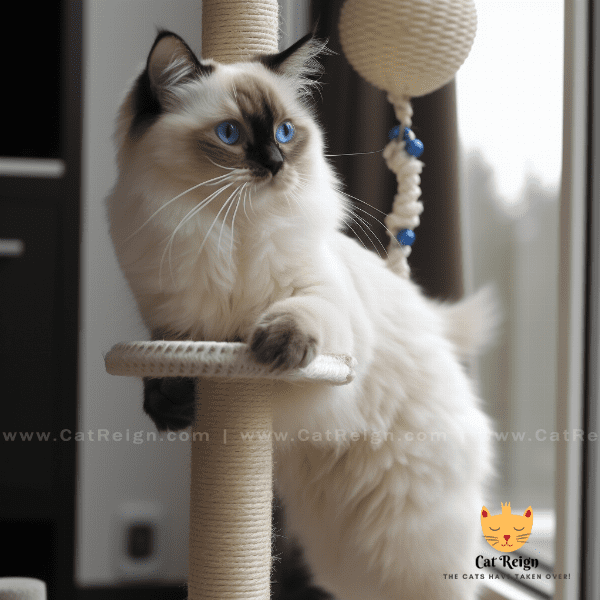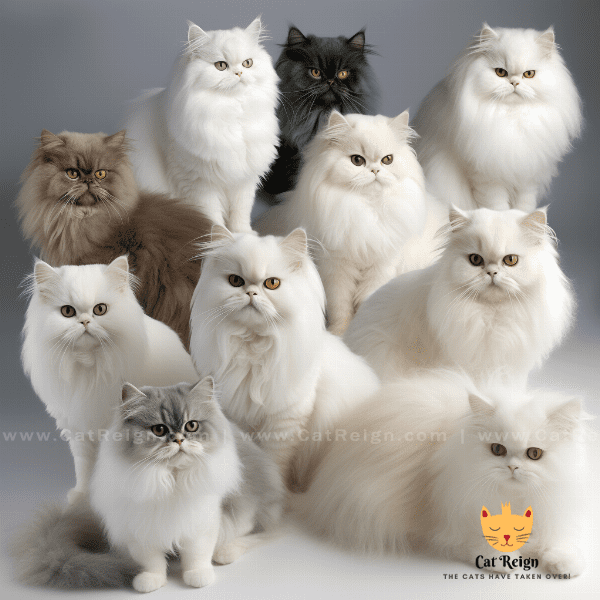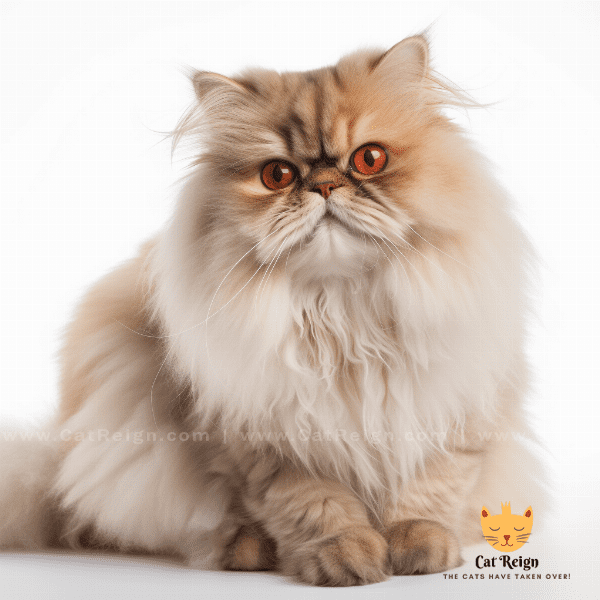Table of Contents
- History and Origin of Birman Cats
- Physical Characteristics of Birman Cats
- Personality Traits of Birman Cats
- Birman Cat Care and Maintenance
- Feeding and Nutrition for Birman Cats
- Common Health Issues in Birman Cats
- Training and Exercise for Birman Cats
- Grooming Tips for Birman Cats
- Birman Cats and Other Pets
- Conclusion: Is a Birman Cat the Right Pet for You?
History and Origin of Birman Cats
Birman cats, also known as the “Sacred Cat of Burma,” have an interesting history that dates back to ancient times. This breed is believed to have originated in the Buddhist temples of Burma, where they were considered sacred companions of the priests.
Mythical Origins
According to Burmese folklore, the Birman cat is believed to have been created by the gods. Legend has it that a group of white cats with yellow eyes lived in the temple of Lao-Tsun. One day, the temple was attacked and the head priest was killed. As the priest lay dying, one of the white cats climbed onto his chest and put his paws on the priest’s head. Suddenly, the cat’s fur turned golden, and his eyes turned blue, just like the priest’s. The other cats in the temple were said to have undergone a similar transformation. From that day on, the Birman cats were considered sacred and were believed to be the priests’ reincarnated companions.
Arrival in Europe
It wasn’t until the late 19th century that Birman cats were introduced to Europe. A pair of Birman cats were given as a gift to an American millionaire named Vanderbilt. From there, the breed made its way to France, where it was further developed and standardized.
Recognition as a Breed
The Birman cat was first recognized as a breed in France in 1925. However, it wasn’t until the 1950s that the breed was imported to the United States. Since then, the Birman cat has become a popular breed worldwide, known for its stunning appearance and affectionate nature.
Conclusion
The history and origin of Birman cats is a fascinating subject that sheds light on the breed’s unique characteristics and qualities. From their mythical origins in Burma to their introduction to Europe and recognition as a breed, Birman cats have a rich and interesting history that has contributed to their popularity as pets today.

Physical Characteristics of Birman Cats
Birman cats are known for their distinctive appearance, which sets them apart from other Cat breeds. From their stunning coat to their piercing blue eyes, Birman cats are truly a sight to behold.
Coat and Color
Birman cats have a medium-length, silky coat that is soft to the touch. The coat is generally light in color, with darker points on the ears, face, legs, and tail. The darker points contrast with the lighter body color, creating a beautiful and striking appearance. The points come in a range of colors, including seal, chocolate, blue, and lilac.
Body Type
Birman cats have a medium-sized body that is muscular and well-proportioned. They have a broad chest and a strong back, which gives them a sturdy and athletic appearance. Birman cats have relatively short legs, which are proportional to their body size. They also have a slightly rounded head with distinctive facial markings that give them a sweet and gentle expression.
Eyes
One of the most striking features of Birman cats is their piercing blue eyes. Their eyes are large and round, with a slightly tilted shape that gives them a curious and alert appearance. The blue color of their eyes is particularly striking against the darker points of their coat.
Conclusion
The physical characteristics of Birman cats are what make them such a unique and beautiful breed. Their soft and silky coat, striking color points, muscular body, and piercing blue eyes all contribute to their distinctive appearance. Whether you’re drawn to their beauty or their affectionate nature, there’s no denying that Birman cats are truly a special breed.

Personality Traits of Birman Cats
Birman cats are known for their affectionate and gentle nature, which makes them great companions for families and individuals alike. Here are some of the key personality traits of Birman cats:
Affectionate
Birman cats are incredibly affectionate and love nothing more than spending time with their humans. They enjoy cuddling, being petted, and following their owners around the house. Birman cats have a reputation for being “lap cats,” meaning they love to curl up on their owners’ laps for a cozy nap.
Sociable
Birman cats are social creatures and get along well with other pets and children. They are not particularly shy or reserved and are often described as outgoing and friendly. Birman cats thrive on attention and love being around their family members.
Intelligent
Birman cats are intelligent animals that are quick to learn new things. They are curious by nature and love exploring their surroundings. Birman cats are also known for their problem-solving abilities, which means they can be trained to do a variety of tricks and behaviors.
Playful
Despite their affectionate nature, Birman cats also have a playful side. They enjoy playing with toys, especially interactive toys that challenge their problem-solving skills. Birman cats also love to climb and jump, so providing them with a variety of toys and play structures can help keep them entertained.
Conclusion
Birman cats are known for their affectionate, sociable, intelligent, and playful nature. Their gentle temperament and love of human interaction make them great pets for families and individuals who are looking for a loyal and loving companion. Whether you’re playing with them, cuddling them, or simply watching them explore their surroundings, Birman cats are sure to bring joy and happiness into your life.

Birman Cat Care and Maintenance
Taking care of a Birman cat involves providing for their basic needs, including food, shelter, exercise, and medical care. Here are some key considerations when it comes to caring for and maintaining a Birman cat:
Feeding
Birman cats require a well-balanced diet that includes high-quality protein, healthy fats, and essential nutrients. It’s important to feed them a diet that is appropriate for their age, weight, and activity level. Some Birman cats may be prone to obesity, so it’s important to monitor their food intake and provide them with regular exercise.
Grooming
Birman cats have a silky coat that requires regular grooming to keep it looking its best. They should be brushed at least once a week to prevent matting and tangling. Birman cats also shed moderately, so frequent grooming can help to reduce the amount of loose hair in your home.
Exercise and Playtime
Birman cats are active animals that require regular exercise and playtime to maintain their physical and mental health. They should have access to toys, scratching posts, and play structures that allow them to climb and jump. Birman cats also enjoy interactive playtime with their owners and can be trained to do a variety of tricks and behaviors.
Medical Care
Birman cats require regular medical check-ups and vaccinations to maintain good health. They should be examined by a veterinarian at least once a year, and should receive appropriate vaccinations and preventative care. Birman cats may be prone to certain health conditions, including heart disease and kidney disease, so it’s important to monitor their health and seek medical attention if any issues arise.
Conclusion
Caring for a Birman cat involves providing for their basic needs, including food, grooming, litter box training, exercise, and medical care. By providing them with the love and attention they need, you can help ensure that your Birman cat leads a happy and healthy life. With proper care and maintenance, your Birman cat can be a loyal and loving companion for years to come.

Feeding and Nutrition for Birman Cats
Proper nutrition is essential for maintaining the health and well-being of your Birman cat. Here are some key considerations when it comes to feeding and providing nutrition for your Birman cat:
Choosing the Right Food
Birman cats require a diet that is high in protein and healthy fats, and low in carbohydrates. When choosing a commercial cat food, look for a high-quality product that is specifically formulated for the nutritional needs of cats. You can also consult with your veterinarian to determine the best type and brand of food for your Birman cat.
Portion Control
Portion control is important when it comes to feeding your Birman cat. Overfeeding can lead to obesity, which can have negative health consequences. You should measure out your cat’s food portions carefully, and provide them with the recommended daily allowance for their weight and activity level.
Water Intake
Water is essential for maintaining your Birman cat’s health and well-being. It’s important to provide them with access to fresh, clean water at all times. Some cats prefer running water, so you may want to invest in a fountain-style water bowl to encourage your cat to drink more water.
Treats
Treats should be given in moderation, as they can contribute to weight gain and other health problems. When giving your Birman cat treats, choose healthy options such as freeze-dried meat or small pieces of cooked chicken or fish.
Conclusion
Feeding and providing proper nutrition for your Birman cat is an important part of maintaining their health and well-being. By choosing the right food, controlling portions, and providing access to fresh water, you can help ensure that your cat gets the nutrition they need to thrive. With proper nutrition and care, your Birman cat can be a happy and healthy companion for years to come.

Common Health Issues in Birman Cats
Like all cat breeds, Birman cats can be prone to certain health issues. Here are some of the most common health problems that Birman cats may face:
Hypertrophic Cardiomyopathy
Hypertrophic cardiomyopathy (HCM) is a type of heart disease that is relatively common in Birman cats. This condition causes the walls of the heart to thicken, which can lead to heart failure. Signs of HCM in Birman cats may include difficulty breathing, lethargy, and a decreased appetite. If you notice any of these symptoms in your Birman cat, it’s important to seek veterinary care right away.
Feline Lower Urinary Tract Disease
Feline Lower Urinary Tract Disease (FLUTD) is a common condition in which a cat experiences inflammation of the urinary tract. Symptoms may include difficulty urinating, urinating outside of the litter box, and blood in the urine. FLUTD can be caused by a variety of factors, including stress, diet, and genetics. Treatment typically involves medication and dietary changes.
Kidney Disease
Kidney disease is relatively common in Birman cats, particularly as they age. This condition can lead to a range of symptoms, including weight loss, increased thirst and urination, and decreased appetite. Treatment may include dietary changes, medication, and in some cases, fluid therapy.
Dental Problems
Birman cats may be prone to dental problems, including tooth decay and gum disease. Signs of dental issues in cats may include bad breath, difficulty eating, and drooling. Regular dental care, including brushing your cat’s teeth and providing dental chews or toys, can help prevent dental problems.
Conclusion
Birman cats may be prone to certain health issues, including heart disease, urinary tract disease, kidney disease, and dental problems. By monitoring your cat’s health and seeking veterinary care as needed, you can help prevent or manage these conditions. With proper care and attention, your Birman cat can lead a happy and healthy life.

Training and Exercise for Birman Cats
Birman cats are active animals that require regular exercise and playtime to maintain their physical and mental health. Here are some key considerations when it comes to training and exercise for your Birman cat:
Exercise Needs
Birman cats have moderate exercise needs and enjoy playing with toys and climbing structures. They also benefit from interactive playtime with their owners, which can include chasing a toy or engaging in a game of hide-and-seek. Providing your Birman cat with plenty of toys and opportunities for play can help keep them active and engaged.
Training
Birman cats are intelligent animals that can be trained to do a variety of tricks and behaviors. Positive reinforcement training methods, such as clicker training, can be effective in teaching your cat new skills. Some common training behaviors for cats include sitting, staying, and coming when called. You can also train your Birman cat to walk on a leash and harness, which can provide additional exercise and mental stimulation.
Conclusion
Training and exercise are important aspects of caring for your Birman cat. By providing them with plenty of toys, opportunities for play, and training, you can help keep them active and engaged. Litter box training is also important for maintaining good hygiene and preventing accidents. With proper training and exercise, your Birman cat can be a happy and healthy companion for years to come.

Grooming Tips for Birman Cats
Brushing
Birman cats should be brushed at least once a week to prevent matting and tangling. Use a soft-bristled brush or a comb to gently remove any knots or tangles in your cat’s fur. Start at the head and work your way down the body, being careful not to pull on any mats or tangles.
Bathing
Birman cats generally do not require frequent baths, as their coat is self-cleaning. However, if your cat gets into something dirty or sticky, you may need to give them a bath. Use a mild shampoo that is specifically formulated for cats, and avoid getting water in their ears or eyes. Be sure to rinse your cat thoroughly and dry them off with a towel.
Nail Trimming
Birman cats should have their nails trimmed regularly to prevent them from becoming too long or sharp. Use a pair of cat nail clippers to carefully trim the tips of your cat’s nails. Be careful not to cut too close to the quick, which is the pink part of the nail that contains blood vessels and nerves.
Teeth Cleaning
Birman cats are prone to dental problems, so it’s important to clean their teeth regularly. Use a soft-bristled toothbrush and a cat-friendly toothpaste to gently clean your cat’s teeth and gums. Start by brushing for just a few seconds at a time, and gradually increase the duration as your cat becomes more comfortable with the process.
Conclusion
Grooming is an important part of caring for your Birman cat. By brushing their coat regularly, trimming their nails, and cleaning their teeth, you can help keep your cat looking and feeling their best. If you’re unsure about how to groom your Birman cat, you can consult with a professional groomer or your veterinarian for guidance. With proper grooming and care, your Birman cat can be a beautiful and healthy companion for years to come.

Birman Cats and Other Pets
Birman cats are known for their sociable nature and generally get along well with other pets, including dogs and other cats. Here are some key considerations when it comes to introducing your Birman cat to other pets:
Slow and Gradual Introductions
When introducing your Birman cat to a new pet, it’s important to do so slowly and gradually. Start by keeping the pets in separate rooms and gradually allow them to spend time together under supervision. This can help prevent any aggressive behavior or territorial disputes.
Early Socialization
Early socialization is important for helping your Birman cat get along well with other pets. This can involve exposing them to other animals from a young age and providing them with positive experiences. Socialization can also involve providing your Birman cat with plenty of toys and playtime to help them develop good social skills.
Monitoring Behavior
Even if your Birman cat gets along well with other pets, it’s important to monitor their behavior and interactions. Some cats may be more dominant or territorial than others, which can lead to aggressive behavior. If you notice any signs of aggression or tension between your pets, it’s important to separate them and seek advice from a professional behaviorist.
Conclusion
Birman cats are generally sociable and get along well with other pets, including dogs and other cats. By introducing your pets slowly and providing them with plenty of socialization and positive experiences, you can help ensure that they get along well. However, it’s important to monitor their behavior and seek professional advice if any issues arise. With proper socialization and care, your Birman cat can be a great companion for other pets in your household.

Conclusion: Is a Birman Cat the Right Pet for You?
Birman cats are a wonderful breed that make great pets for many households. However, like any pet, they require time, attention, and care. Here are some key considerations to help you decide if a Birman cat is the right pet for you:
Personality and Temperament
Birman cats are known for their friendly, sociable nature and make great companions for families and individuals alike. They are also active and playful, and enjoy interacting with their owners.
Grooming Needs
Birman cats have a beautiful, silky coat that requires regular grooming to keep it looking its best. If you’re not willing to commit to regular grooming, a Birman cat may not be the right pet for you.
Health Issues
Like all cats, Birman cats can be prone to certain health issues, including heart disease, urinary tract disease, kidney disease, and dental problems. It’s important to be aware of these potential health issues and to provide your cat with regular veterinary care.
Time and Attention
Birman cats require time and attention from their owners, including regular playtime and socialization. If you’re not able to provide your cat with the time and attention they need, a Birman cat may not be the right pet for you.
Conclusion
Birman cats are a wonderful breed that make great pets for many households. However, they do require time, attention, and care, so it’s important to carefully consider whether a Birman cat is the right pet for you. If you’re willing and able to provide your cat with the love and care they need, a Birman cat can be a wonderful and rewarding companion for many years to come.




